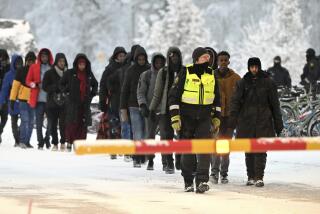Moscow Rushes Reinforcements to Azerbaijan
- Share via
MOSCOW — The KGB security police rushed reinforcements to the Iranian border Wednesday to stop rampaging Soviet Azerbaijanis from forcing open the frontier by demolishing guard towers and security alarms, official media reported.
The Soviet government daily Izvestia said that after three days, the disturbances had spread along Azerbaijan’s nearly 500-mile-long border with Iran. One protester was reported killed.
The newspaper said the Azerbaijanis want their Soviet republic united with a region peopled by their ethnic kin in northern Iran, and they have threatened to remove all border barriers unless authorities do so.
Azerbaijani activists, however, say they merely want an open border and the freedom to trade and cross the frontier, practices suspended four decades ago by Josef Stalin.
The unrest in the Soviet Caucasus adds to the ethnic headaches already facing President Mikhail S. Gorbachev as his reforms unleash long pent-up grievances of the country’s many nationalities. The Caucasus has already been torn for two years by strife among Azerbaijanis, Armenians, Georgians, Abkhazians and other ethnic groups.
The unrest on the Soviet-Iranian frontier introduced a new international element with political and religious overtones. The dispatch of reinforcements, as reported by Izvestia, made clear that detachments of KGB border troops regularly stationed along the border were incapable of quashing the violence.
The official news agency Tass said that about 7,500 protesters destroyed guard towers, electronic alarm equipment and communications lines along the border when the unrest began Dec. 31.
Izvestia, quoting I. Petrovas, chief of the KGB’s Caucasus border district, reported that the “illegal actions” continued Wednesday but gave no details of the latest trouble.
“Practically along the entire border between Azerbaijan and Iran a complex situation has emerged,” Izvestia said in a report headlined “Pogrom on the Soviet-Iranian Border.”
The report said the turmoil had spread from the Azerbaijani enclave of Nakhichevan, located between Armenia and Iran, to the regions of Zangelansk and Pushkinsk and the Caspian Sea port of Lenkoran in Azerbaijan itself.
Lt. Gen. Nikolai Britvin, head of the political department of the KGB’s special border guard units, told Tass, however, that the incidents lasted only through Tuesday and that the situation was “gradually returning to normal.”
Nonetheless, he said additional border guards were being sent in with armored personnel carriers. Neither he nor Izvestia said how many guards were normally stationed along the Soviet-Iranian border or how many reinforcements were sent.
The reports in state-run Soviet media said that the protesters, led by the grass-roots political group Azerbaijan People’s Front, had been threatening for weeks to go on a rampage and refused to accept concessions by officials.
Quoting Britvin, Tass said one person was killed in a clash among the protesters but did not say when or how many may also have been injured. Border guards did not use their weapons and none was hurt despite threats against them, it said.
Izvestia said some protesters were armed with pistols and hunting rifles and estimated that they did more than $8.2 million in damage.
In the first Soviet media report Tuesday on the border rampage, Tass said some protesters were drunk or high on narcotics. Those claims, vigorously denied by Azerbaijan People’s Front officials, were not repeated on Wednesday.
The seeds of the unrest were sown Dec. 4 when a crowd of Soviet Azerbaijanis gathered at the border with loudspeakers and called on their Iranian neighbors, both members of the same ethnic group and predominantly Shiite Muslims, to unify their regions, Izvestia reported.
About 4 million ethnic Azerbaijanis live in the adjoining Iranian province of Azerbaijan, where Stalin briefly set up a puppet state during World War II before being forced by Western powers to withdraw in 1946.
Soviet Azerbaijanis have been camped along the border for nearly a month in hopes of seeing relatives and friends on the other side, a People’s Front member said.
On Dec. 12, Azerbaijani protesters warned border guards they would destroy barriers at the border unless they were removed by Dec. 31, according to Izvestia.
Authorities agreed to ease travel restrictions, move some border posts and improve “conditions for economic activity” in the region, Tass said. But it said protesters declared a “Frontier Week” from Jan. 1-7 and vowed to destroy border structures.
More to Read
Sign up for Essential California
The most important California stories and recommendations in your inbox every morning.
You may occasionally receive promotional content from the Los Angeles Times.













